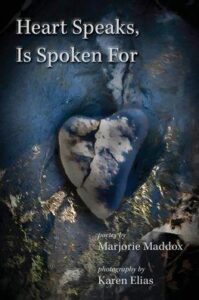 Heart Speaks, Is Spoken For, poetry by Marjorie Maddox;
Heart Speaks, Is Spoken For, poetry by Marjorie Maddox;
Shanti Arts Publishing, 2022 (release March 2022)
$22.95 USD
Review by: Pamela R. Anderson-Bartholet
Poet Marjorie Maddox’s most recent collection—Heart Speaks, Is Spoken For—begins with a stranger traveling across an icy highway before being snagged into a chain reaction accident. The specter of this unknown man inhabits the first handful of poems every bit as much as his transplanted heart is contained behind her father’s “beautiful fence” (Transplanted/Heart Speaks, Is Spoken For); the knowledge of this selfless final gift works to inform much of the collection.
Accompanying each poem are discretely titled photographs of a cracked, heart-shaped stone. At times, the heart stone is snugged into the natural world: a tree stump…two daisies…seaweed fronds…a twig holding fast to pale, gold leaves. At other times, it rests against the material world: pavement…chain-link fencing…two windows flanked by green shutters. If these images by photographer Karen Elias seem uncomplicated in their simplicity, the juxtaposition with the poems tells a more complicated story, with the blended genres so intertwined that it is impossible to imagine one without the other.
In the beginning, there was the accident. With each successive poem, the poet observes some new detail that reveals the physical complexities of transplanting organs as well as the angst felt by recipients and their extended families. Maddox presents conflicting emotions starkly, as when a child in the transplant waiting room asks her mother “Will Daddy love the same people?” (Disconnected/Disconnected) or when the recipient “dreamed his donor’s/face, limbs, lungs; sung in his sleep/the dead man’s favorite song” (Transplanted/Heart Speaks, Is Spoken For.). The paradox between a life slipping away to restore another life is a hard one to accept “while the crying bystanders pray for mercy, for miracles” (Heart in a Box/Remember Me.). We know that, in the end, someone will have been restored but only because someone else was broken.
It is with grace and skill that Maddox cradles that idea of brokenness—in physical body, through domestic abuse, during the pandemic, in our environment, and with social justice issues. Somehow she manages to hold both joy and sorrow in her hands. She reminds us to appreciate hopeful moments that may quell fears when the “night creeps close on dead leaves” (Chopping Block/Heart Waiting for Danger) or when we recognize that we live in a “year of shifting/sorrows” (Bury Our Heart/Fractured Heart). She embraces the positive: a “single blue jay dotting/the drab day with color” (Quarantine/Two Hearts, Two Windows)—“the tattooed rays of one more orbit/of earth around a sun that says “Hold on,/hold on, hold on.”” (Heart, Lichen, Stone/Heart Holding On).
It is with this beautiful, insightful book of poems and photographs that we are able to hold on. To do otherwise would be to look away from the perfections and imperfections of the heart and of the stone.
That idea is powerfully expressed in the poem Memorial for George Floyd in Black and White and its accompanying photograph of the heart stone resting on a metal grate and surrounded by tiny white flowers.
“Cracked, gray-gone-dead:
the stone-cold heart pinned
by the pale blooms of buds
in this city that fences out
cherry blossoms and peace—”
If a peaceful existence and the world’s natural beauty are being excised, what will remain? In this book, Maddox offers lessons in the wisdom of a few fairy tales. She reminds us that the woodcutter disobeyed the evil Queen’s command to bring her Snow White’s heart (Sepia/Heart Tree), ensuring that an innocent life could continue. She reflects on Hansel and Gretel and their dogged march forward in what she describes as “the real work of the living” (The Long and Winding Road/Asphalt Heart).
In the end, she urges a return to the land and the “dirt that holds//and enfolds us in Earth’s/quiet comfort of calm.” It is a fitting conclusion—a reminder that life is “singing//us toward each day’s/shimmering season of sleep” (Day is Done. Is Beginning./Two Hearts).
I celebrate Poet Marjorie Maddox and Photographer Karen Elias in this collaboration. Maddox is a Professor of English and Creative Writing at Lock Haven University, has published 13 collections of poetry, and won the 2019 Foley Poetry Price for her poem “Arise,” about the Thailand cave rescue. Elias taught college English for 40 years but now is focused on using photography to record the fragility of the natural world while raising awareness about climate change. Their creation in Heart Speaks, Is Spoken For gently and thoughtfully examines the human heart and the stone heart. In this book, they are inseparable.
—
Pamela R. Anderson-Bartholet is the author of three poetry chapbooks, including Widow Maker (Finishing Line Press), a chronicle of her husband’s cardiac arrests/recovery. Formerly a public radio fundraiser, Anderson-Bartholet hit the jackpot when she retired and finally was able to channel her energies into hiking with her husband, practicing yoga, writing, and reading.
Website: https://www.pamelaranderson.org/
Instagram: @prandersonpoet